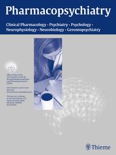
PHARMACOPSYCHIATRY
Scope & Guideline
Advancing the Frontiers of Pharmacological Psychiatry.
Introduction
Aims and Scopes
- Pharmacotherapy in Psychiatry:
The journal covers a wide range of pharmacological treatments for psychiatric disorders, including antidepressants, antipsychotics, mood stabilizers, and emerging therapies such as cannabinoids and psychedelics. - Therapeutic Drug Monitoring (TDM):
A core area of focus is on therapeutic drug monitoring, which assesses drug levels in patients to optimize treatment efficacy and minimize adverse effects, particularly in vulnerable populations such as children and those with complex psychiatric conditions. - Pharmacogenetics and Personalized Medicine:
The journal emphasizes the role of pharmacogenetics in tailoring psychiatric treatments based on individual genetic profiles, thereby enhancing treatment outcomes and reducing the risk of adverse drug reactions. - Innovative Treatment Approaches:
Research on novel treatment modalities, including the use of medical cannabis, psychedelics, and non-dopaminergic therapies, reflects a commitment to exploring cutting-edge strategies in psychiatric care. - Epidemiological Studies and Clinical Trials:
The journal publishes findings from epidemiological studies and clinical trials that inform clinical practices and guidelines, particularly in relation to the pharmacological treatment of psychiatric disorders.
Trending and Emerging
- Impact of COVID-19 on Psychiatric Treatment:
Recent publications have increasingly focused on the implications of COVID-19 for psychiatric care, including the effects of antidepressants on COVID-19 prognosis and the mental health challenges arising from the pandemic. - Integration of Cannabinoids in Psychiatry:
There is a growing body of research exploring the role of cannabinoids in treating various psychiatric conditions, reflecting a trend towards integrating alternative and complementary therapies into mainstream psychiatric practice. - Advancements in Therapeutic Drug Monitoring:
Research on therapeutic drug monitoring is expanding, with a focus on developing guidelines and protocols for specific populations, such as children, pregnant women, and patients with complex medical histories. - Psychedelic Research as a Treatment Paradigm:
The exploration of psychedelics as therapeutic agents in psychiatry is gaining momentum, with increasing interest in their potential benefits for conditions like depression and PTSD, marking a significant shift in treatment paradigms. - Pharmacogenetics and Personalized Treatment Strategies:
The emphasis on pharmacogenetics is on the rise, with studies investigating how genetic variations affect drug metabolism and response, paving the way for more personalized treatment approaches in psychiatry.
Declining or Waning
- Traditional Antidepressant Approaches:
Over recent years, there has been a noticeable decrease in studies focused exclusively on traditional antidepressant therapies, such as SSRIs and SNRIs, as more attention shifts towards innovative treatments and personalized medicine. - Longitudinal Studies on Lithium Use:
The interest in lithium therapy appears to be waning, as evidenced by fewer publications regarding its use in contemporary psychiatric practice, possibly due to the rise of newer medications and treatment modalities. - Generalized Approaches to Psychotropic Medications:
There is a declining emphasis on generalized or non-specific approaches to psychotropic medications, with a shift towards more targeted and individualized treatment strategies based on pharmacogenetic and biomarker research.
Similar Journals
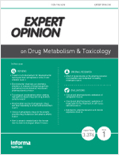
Expert Opinion on Drug Metabolism & Toxicology
Exploring the Intersection of Drug Development and SafetyExpert Opinion on Drug Metabolism & Toxicology, published by Taylor & Francis Ltd, is a leading journal in the fields of pharmacology and toxicology, with a distinguished reputation gleaned from its Q1 rankings in both disciplines as of 2023. With an ISSN of 1742-5255 and an E-ISSN of 1744-7607, this journal aims to foster innovative discussions and critical insights into the metabolism and toxicological assessment of drugs, appealing to a wide audience of researchers, professionals, and students. The journal's commitment to maintaining high academic standards is reflected in its placement within the top quartiles of the Scopus rankings—ranked 17th in Toxicology and 73rd in Pharmacology—demonstrating its significant impact and relevance in advancing knowledge within the drug development sector. Published since 2005 and converging into 2024, it provides a platform for timely dissemination of expert opinions, systematic reviews, and original research, reinforcing its vital role in shaping the future of pharmacological sciences in an ever-evolving landscape.
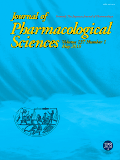
Journal of Pharmacological Sciences
Empowering health through cutting-edge pharmacological insights.Journal of Pharmacological Sciences is a leading peer-reviewed academic journal dedicated to the field of pharmacology, published by the Japanese Pharmacological Society. Since its inception, this journal has offered an essential platform for the dissemination of high-quality research, contributing significantly to advancements in molecular medicine and pharmacology. With an impact factor that places it in the prestigious Q2 quartile for both categories, the journal has established itself as a credible source of innovative findings and methodologies since its transition to Open Access in 2015. This accessibility enables a broader audience, including researchers, healthcare professionals, and students, to engage with valuable insights and discussions pertinent to drug development, pharmacodynamics, and therapeutic strategies. Based in Kyoto, Japan, the journal serves as a vital resource for the global pharmacological community, encouraging collaboration and research that leads to improved health outcomes. For more information, submissions, and access to the latest research, visit the journal’s website.

Current Neuropharmacology
Advancing neurotherapeutics for a healthier mind.Current Neuropharmacology is a premier journal dedicated to advancing the field of neuropharmacology, published by Bentham Science Publishers Ltd in the United Arab Emirates. As a leader in its domain, this journal has achieved a remarkable position in 2023, with Q1 rankings across several categories including Medicine (miscellaneous), Neurology, and Pharmacology. With a robust focus on the latest research related to pharmacological treatments and their neurological implications, Current Neuropharmacology features cutting-edge studies that inform clinical practices and psychiatric care. Although not open access, the journal offers both print and electronic formats to cater to a diverse audience of researchers, healthcare professionals, and students keen on accessing vital information in neuropharmacology. Its high impact within the academia is underscored by impressive Scopus rankings, confirming its importance as a vital resource for the ongoing exploration of mental health and neurotherapeutic innovations. With an engaging scope that encompasses emerging discoveries and clinical advancements, Current Neuropharmacology continues to be an essential platform for scholarly communication in the evolving landscape of neuroscience and pharmacology.

DRUGS & THERAPY PERSPECTIVES
Navigating the Evolving Landscape of PharmacologyDRUGS & THERAPY PERSPECTIVES is an esteemed journal published by SpringerNature, dedicated to advancing knowledge in the field of pharmacology and therapeutic studies. With an ISSN of 1172-0360 and an E-ISSN of 1179-1977, this journal has been providing valuable insights since its inception in 1993 and continues to publish until 2024. Ranked in the Q3 category for Pharmacology (medical) and positioned within the 25th percentile according to Scopus rankings, it serves as a vital resource for researchers, practitioners, and students alike. Although it is not an open-access journal, it offers a comprehensive platform for innovative research, clinical practices, and evolving therapeutic strategies, reflecting the critical developments in drug therapy landscape. With its strategic emphasis on bridging academic studies and clinical applications, DRUGS & THERAPY PERSPECTIVES remains essential for those committed to enhancing drug efficacy and patient outcomes in the ever-evolving medical field.

Expert Review of Neurotherapeutics
Pioneering Innovations for Neurological HealthExpert Review of Neurotherapeutics is an esteemed journal published by Taylor & Francis Ltd, focusing on the rapidly evolving field of neurotherapeutics. With an ISSN of 1473-7175 and an E-ISSN of 1744-8360, this publication aims to bridge the gap between clinical and preclinical research, providing a platform for innovative therapeutic strategies in neurology and neuroscience. The journal boasts impressive impact factor rankings, categorized as Q2 in both clinical neurology and miscellaneous neuroscience, and Q1 in medical pharmacology for 2023. Its reputable placement in Scopus rankings, including Rank #82/400 in clinical neurology, underscores its significance within the medical research community. Spanning from 2001 to 2024, the journal publishes critical reviews and original research articles aimed at enhancing understanding and treatment in neurological disorders. Although it currently does not offer open access, articles published in the journal are crucial for researchers, healthcare professionals, and students seeking to stay at the forefront of advancements in neurotherapeutics. With its strong emphasis on rigorous peer-reviewed content, Expert Review of Neurotherapeutics continues to be a vital resource for those dedicated to improving patient outcomes in the realm of neurology.

CLINICAL PHARMACOKINETICS
Bridging Research and Clinical ApplicationCLINICAL PHARMACOKINETICS, published by ADIS INT LTD, is a premier journal dedicated to the field of pharmacology, with a distinguished reputation since its inception in 1976. With an impressive impact factor and categorized in the Q1 quartile for both general pharmacology and medical pharmacology, this journal ranks #29 out of 272 and #53 out of 313 in its respective categories in Scopus, highlighting its high academic influence and the quality of research it publishes. CLINICAL PHARMACOKINETICS serves as a vital resource for researchers, professionals, and students interested in the latest advancements in drug metabolism, therapeutic efficacy, and clinical applications of pharmacokinetic studies. As it continues to evolve through 2024 and beyond, the journal remains committed to fostering a deeper understanding of pharmacotherapy and its implications in clinical practice. While it does not currently offer open access, the journal ensures that cutting-edge research is accessible through various academic platforms.

Journal of Psychiatric Practice
Fostering collaboration and knowledge in the field of psychiatry.Journal of Psychiatric Practice, published by Lippincott Williams & Wilkins, is a premier journal dedicated to advancing the field of psychiatry and mental health. With a focus on evidence-based clinical practice, the journal has been a respected resource since its inception, providing a platform for a wide range of articles, including original research, reviews, and case reports from 1997 to the present. As of 2023, it holds a Q3 ranking in Psychiatry and Mental Health, reflecting its influential role in the academic community. The Journal is aimed at researchers, mental health professionals, and students, promoting the dissemination of essential knowledge and innovative practices. Subscribers benefit from the latest findings and discussions in the field while contributing to the ongoing advancements in psychiatric care. Although not classified as open access, the journal ensures wide accessibility to its valuable content, further solidifying its commitment to the mental health discipline.
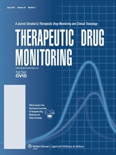
THERAPEUTIC DRUG MONITORING
Advancing Pharmacology for Safer, More Effective TherapiesTHERAPEUTIC DRUG MONITORING, published by Lippincott Williams & Wilkins, is a prestigious journal that focuses on the critical area of pharmacology, with a specific emphasis on the therapeutic optimization of drug therapy. With an ISSN of 0163-4356 and an E-ISSN of 1536-3694, this peer-reviewed journal has been contributing valuable research and insights to the field since its inception in 1979. As of 2023, it holds a Q2 classification in the Pharmacology category, indicating its prominent role in advancing pharmaceutical sciences. The journal aims to enhance understanding of drug effectiveness and safety through rigorous studies on drug monitoring and individualized therapy, making it an essential resource for researchers, healthcare professionals, and students dedicated to improving patient care. With its solid standing reflected in Scopus rankings, including a rank of #103 in medical pharmacology and a 62nd percentile, THERAPEUTIC DRUG MONITORING continues to be a vital publication for those aiming to contribute to and stay informed about the latest developments in the field.
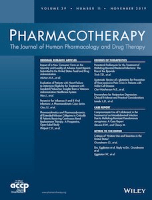
PHARMACOTHERAPY
Fostering Excellence in Medical PharmacologyPHARMACOTHERAPY, an esteemed journal published by WILEY, stands as a pivotal resource within the field of medical pharmacology. With its ISSN 0277-0008 and E-ISSN 1875-9114, this journal has been at the forefront of pharmacological research since its inception in 1981. Renowned for its rigorous peer-review process and impactful contributions, it currently holds a prestigious Q1 quartile ranking in the pharmacology category, underscoring its significance as a leading publication in the field. It ranks #40 out of 272 journals in Scopus, placing it in the top 15% percentile of its category. While not an open-access publication, PHARMACOTHERAPY remains committed to advancing knowledge and understanding in pharmacological sciences, making it an indispensable resource for researchers, healthcare professionals, and students dedicated to improving therapeutic outcomes and drug utilization. Based in the United States, at 111 River St, Hoboken, NJ, the journal is poised to continue its impact through to 2024 and beyond, welcoming contributions that further the discourse in pharmacotherapy.
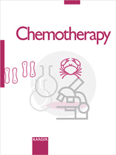
CHEMOTHERAPY
Shaping the Future of Pharmacological SciencesCHEMOTHERAPY, published by KARGER, is a premier academic journal established in 1960, dedicated to disseminating cutting-edge research and advancements in the fields of drug discovery, infectious diseases, oncology, and pharmacology. With an impressive Scopus ranking placing it in the Q2 category for major disciplines such as Drug Discovery and Infectious Diseases, this journal provides an invaluable platform for researchers and professionals aiming to explore new therapeutic approaches and methodologies. Located in the heart of Switzerland, its publications are a key resource for anyone looking to stay informed about the latest developments and trends in the pharmacological sciences. Researchers can benefit from its diverse scope while contributing to a growing body of knowledge that emphasizes the importance of effective chemotherapeutic strategies in modern medicine. Despite not being an Open Access journal, CHEMOTHERAPY remains committed to maintaining a rigorous peer-review process, ensuring the highest quality of published work.